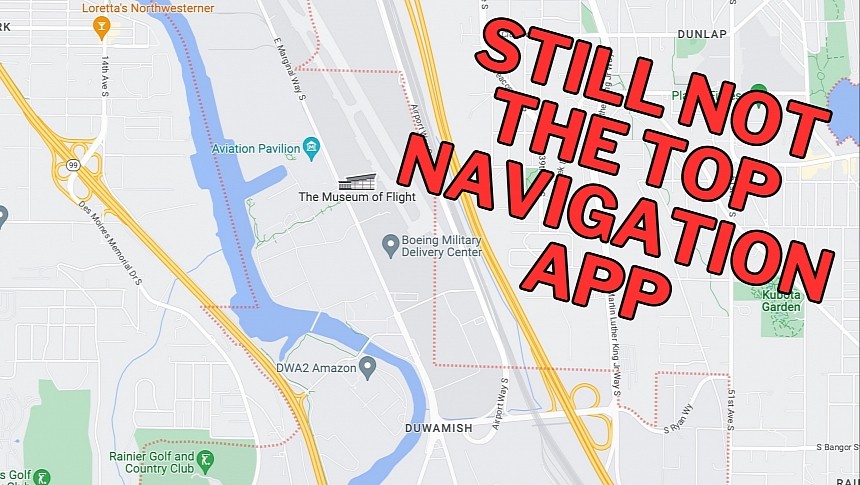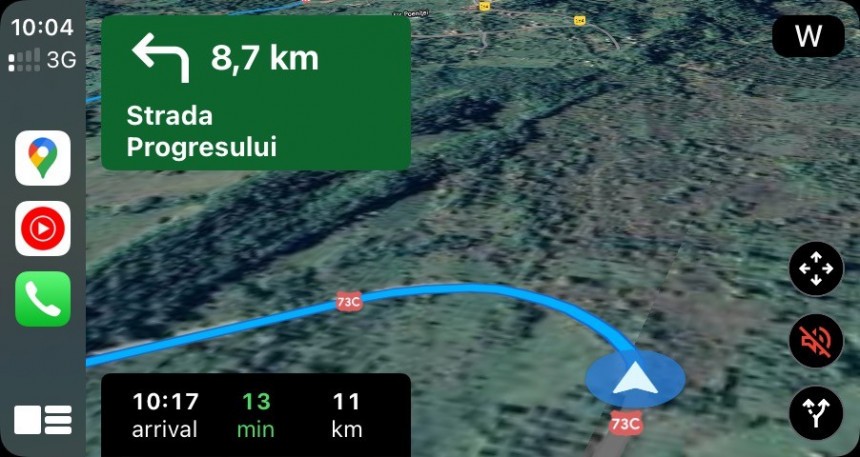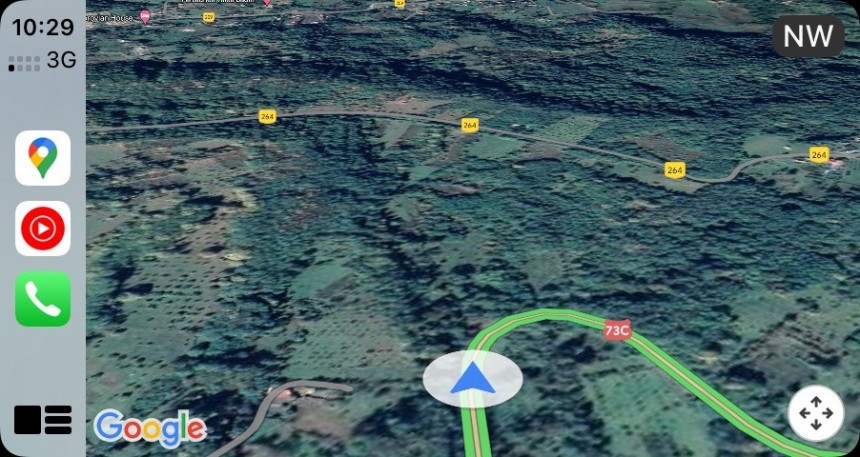Google Maps is often considered the number one navigation app, but according to recent research from TechInsights, Google's solution is no longer the world's leading location platform.
HERE is the king of the castle in this market, but Google Maps is close with a competitive feature lineup, making it the preferred choice for millions of users.
The study also provides us with a closer look at the strengths and weaknesses of the most popular location platforms, and in Google's case, the search giant has a lot of room for improvement.
TechInsights claims Google's number one strength is its deep pockets. The search giant is one of the most valuable companies in the world, so it has enough money to invest in making Google Maps better.
Apple is currently the most valuable firm in the world, with a market cap that exceeds $3 trillion. Google is far behind its American rival but still has the financial resources to develop new innovative features for its location platform.
Then, the study found that Google has very strong consumer brand recognition. If anything, Google's brand is the strongest in the location platform market, as neither HERE nor Mapbox is as popular as the search giant. TechInsights claims Google Maps has billions of monthly active users worldwide.
The search giant also targets the consumer market and efficiently attracts users thanks to the search engine. Google is the number one search engine in the world, so bringing users to Google Maps is quite easy. Google Maps is integrated into Google Search, so users searching for a business or a location can easily see additional information on the mapping platform.
Google Maps features the largest number of POIs and the most granular information. Google's maps cover a substantial part of the world, and the points of interest are a double win for the company. The POIs include businesses, stores, restaurants, and other locations with a strong presence on Google. The concept produced a win-win, as Google benefits from more locations making their way to Google Maps while businesses expand their online presence, getting in touch with consumers worldwide.
TechInsights claims that local guides are key in improving the POI database. Google has over 150 million local guides that submit information.
Google's leadership in machine learning and artificial intelligence places it at the forefront of the navigation space, as the company can also expand its location platform in this direction. Google is already working on new innovative capabilities for Google Maps, and the immersive view is living proof on this front. Immersive view fuses street-level imagery, satellite data, traffic patterns, and other information to create a realistic 3D view of a specific location.
The Mountain View-based firm is also expanding its indoor maps at a very fast pace. Currently, it covers approximately 10,000 locations, and the number keeps growing as Google wants to turn Google Maps into the preferred choice inside buildings.
Last but not least, the large developing community using Google Maps to power location services integrated into their apps is a major strength. No other company has a community this large.
Google is one of the dominating names in the navigation space, but it still has a series of weaknesses, starting with its non-existing China presence. Google couldn’t expand in China, so local users rely on alternative products, typically developed by local companies.
Google is often perceived as a strategy threat by some carmakers, especially as tech companies are slowly expanding into the automotive world. However, compared to rival Apple, Google sticks with software and services – Apple is developing a complete car, with the debut projected to happen in 2025 or 2026. Some carmakers are afraid that Google could eventually follow in Apple's footsteps.
Another major Google Maps weakness comes down to privacy and use of data concerns. Google's obsession with user data fueled privacy advocates, with some users avoiding Google Maps, mainly because of data collection.
The research also indicates that Google's location services are behind a walled garden, compared to competitors. Most users think about Apple whenever they hear about a walled garden, but Google also likes to maintain control of its mapping platform, especially for API integration. This is a significant weakness versus its rivals, TechInsights claims.
Last but not least, Google does not have access to large developer ecosystems, such as Azure and AWS, because it's a rival to the parent companies in the first place. Google is investing in its cloud platforms, so using Azure and Amazon Web Services is impossible.
Eventually, fake listings continue to pose a major challenge to Google, as the company still hasn't found an efficient way to prevent them from reaching users. The company introduced new security protections to block fake listings, but the study acknowledges this issue as a major weakness in the navigation battle.
The study also provides us with a closer look at the strengths and weaknesses of the most popular location platforms, and in Google's case, the search giant has a lot of room for improvement.
The strengths
Apple is currently the most valuable firm in the world, with a market cap that exceeds $3 trillion. Google is far behind its American rival but still has the financial resources to develop new innovative features for its location platform.
Then, the study found that Google has very strong consumer brand recognition. If anything, Google's brand is the strongest in the location platform market, as neither HERE nor Mapbox is as popular as the search giant. TechInsights claims Google Maps has billions of monthly active users worldwide.
The search giant also targets the consumer market and efficiently attracts users thanks to the search engine. Google is the number one search engine in the world, so bringing users to Google Maps is quite easy. Google Maps is integrated into Google Search, so users searching for a business or a location can easily see additional information on the mapping platform.
Google Maps features the largest number of POIs and the most granular information. Google's maps cover a substantial part of the world, and the points of interest are a double win for the company. The POIs include businesses, stores, restaurants, and other locations with a strong presence on Google. The concept produced a win-win, as Google benefits from more locations making their way to Google Maps while businesses expand their online presence, getting in touch with consumers worldwide.
TechInsights claims that local guides are key in improving the POI database. Google has over 150 million local guides that submit information.
Google's leadership in machine learning and artificial intelligence places it at the forefront of the navigation space, as the company can also expand its location platform in this direction. Google is already working on new innovative capabilities for Google Maps, and the immersive view is living proof on this front. Immersive view fuses street-level imagery, satellite data, traffic patterns, and other information to create a realistic 3D view of a specific location.
The Mountain View-based firm is also expanding its indoor maps at a very fast pace. Currently, it covers approximately 10,000 locations, and the number keeps growing as Google wants to turn Google Maps into the preferred choice inside buildings.
Last but not least, the large developing community using Google Maps to power location services integrated into their apps is a major strength. No other company has a community this large.
The weaknesses
Google is often perceived as a strategy threat by some carmakers, especially as tech companies are slowly expanding into the automotive world. However, compared to rival Apple, Google sticks with software and services – Apple is developing a complete car, with the debut projected to happen in 2025 or 2026. Some carmakers are afraid that Google could eventually follow in Apple's footsteps.
Another major Google Maps weakness comes down to privacy and use of data concerns. Google's obsession with user data fueled privacy advocates, with some users avoiding Google Maps, mainly because of data collection.
The research also indicates that Google's location services are behind a walled garden, compared to competitors. Most users think about Apple whenever they hear about a walled garden, but Google also likes to maintain control of its mapping platform, especially for API integration. This is a significant weakness versus its rivals, TechInsights claims.
Last but not least, Google does not have access to large developer ecosystems, such as Azure and AWS, because it's a rival to the parent companies in the first place. Google is investing in its cloud platforms, so using Azure and Amazon Web Services is impossible.
Eventually, fake listings continue to pose a major challenge to Google, as the company still hasn't found an efficient way to prevent them from reaching users. The company introduced new security protections to block fake listings, but the study acknowledges this issue as a major weakness in the navigation battle.











